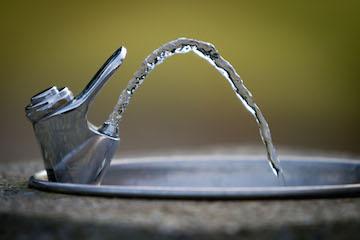Campus Water Tests Meet EPA Safety Standards for Lead

06/07/2016
Earlier this spring, amid growing public concern related to the presence of lead in the drinking water of aging school buildings, participants in SUNY Cortland’s Joint Labor-Management/Environmental Health and Safety Committee raised questions about the College’s drinking water.
In response, the College tested water from 63 of the 232 drinking fountains in buildings throughout campus in, using standard methods approved by the federal Environmental Protection Agency. All campus buildings were represented.
We are pleased to announce that none of the tested fountains are currently above the action level set by the EPA. More than half show no presence of lead at all.
This indicates that SUNY Cortland’s water system – the infrastructure of pipes that feed the campus and its buildings – is free from widespread lead contamination.
Two of the tested fountains – old, seldom-used models in Corey Union and Van Hoesen Hall – initially showed lead levels that were above the EPA threshold of 15 parts per billion. (49 parts per billion in Corey and 29 parts per billion in Van Hoesen) Upon re-testing, however, both fountains tested below the action level. It should be noted that these two fountains were immediately taken out of service by the college after the initial tests. Although their follow-up tests were below the action level, both fountains will remain out of service until they are replaced.
Technically, there is no “safe” level for lead contamination. Lead’s health impacts depend on many variables, including the amount consumed, length of exposure and an individual’s size, age and health. To put SUNY Cortland’s findings in perspective, however, consider that the contamination levels that caused health problems in Flint, Mich. ranged from a low of 200 parts per billion to a high of 13,000 parts per billion.
Please keep in mind that the EPA’s action level is not a hard line for toxicity. Rather it is the level at which the EPA recommends action be taken to reduce the lead content of the water. More information about the EPA’s approach to minimizing the lead in drinking water is available on the agency’s website.
Although our water system meets EPA requirements, SUNY Cortland wants to make sure that no individual drinking fountains are contaminated by lead from sediment or old soldering connections. That’s why the College will test all campus fountains. That work should be completed sometime in 2016.
If anyone has concerns or questions, they may contact Glenn Wright, director of environmental health and safety at 607-753-2508 or glenn.wright@cortland.edu.

